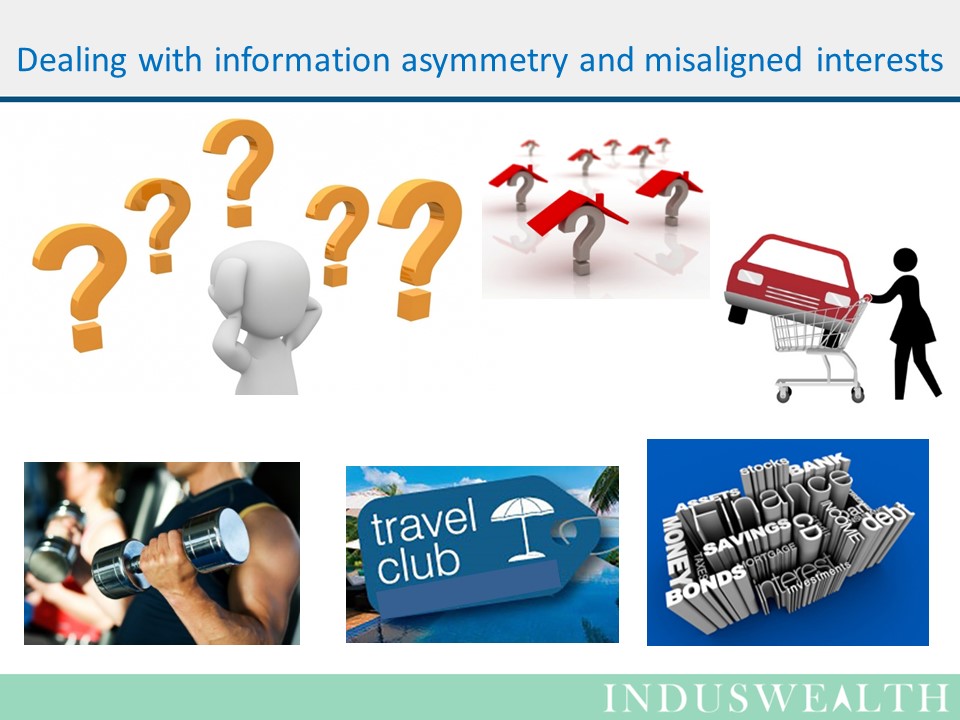Let’s say I am buying a used car, I will have no information if the car has a problem or if it was involved in an accident. The seller has this information but has no incentive to disclose this information to me.
In our lives we make decisions based on incomplete information, sometimes we don’t have the resources required to get the information, sometimes the information is not available and we still need to get on with life.
Let’s look at a few examples of challenges we encounter in our lives and discuss potential strategies to deal with them.
- Purchasing goods: If you are in looking to purchase a car, or white goods, house – the agent (sales person, broker etc) who is “assisting” you will be compensated based on the size of your purchase. The more expensive item you buy, the more bells and whistles you buy – the higher is the sales commission. You may want to remember that the sales person however charming is not in your corner. Potential strategies to deal with this –
- Do your own research and don’t depend on the sales person for the expertise.
- If you need advice about the product get that from a party that has nothing to gain from the purchase.
- For large purchases – pl write down what you are looking for upfront and see if the final product you are selecting is having features you were not looking for in the first place. This way you can avoid purchasing features that you were not keen about.
- Avoid making decisions of adding options on the spot and take time to sleep over the decisions and evaluate if you really need the additional bells and whistles.
- Gym and travel club memberships: Gyms and travel clubs know that many people will sign up but only a few will use the facilities. That is one of the reasons why they have an upfront yearly payment system ensuring that they get paid upfront. Once the payment is made they have no interest in encouraging you to use the facility. Potential strategies to deal with this –
- Unless you know your usage pattern well – avoid signing up based on “hope/plan of using the facility”. Use data about your past behavior as a predictor. If you are regular at a gym then you can sign up.
- If you are new to gym or club membership, experiment with a temporary membership where the stakes are low. Even is the short term costs are high you may be avoiding spending money on something you will not use.
- Consider aligning interests – like hiring a trainer at the gym whose payment is linked to the number of sessions you attended. Your trainer will have the incentive to encourage you to use your membership.
- Financial products: These is also quite tricky as there is a significant information asymmetry. A person selling the financial product has access to more information about the product than you have. It could be reasonable to assume the insurance, mutual fund, credit product is being sold to you in preference to others as it would generate more commissions for the seller. Ideally you want to seller to benefit when the product is delivering what it is expected from it, so you should look for offerings where the seller benefits only if you benefit. Strategies that can be considered in such cases
- Educate yourself, here the goal is not to be an expert but to learn enough to understand the product and ask reasonable questions.
- Get data – before asking your finance professional for their opinion, pl ask them for data, especially details if possible in writing. Read the fine print.
- Review the product data critically – data presented to you might gloss over the key challenges.
- Ask questions about the cases when the product is not suitable.
- Get an opinion from an independent party who is not going to benefit if you purchase the product. (This could be a friend who knows the product well, your CA or your investment adviser).
- Understand the incentive structure – read up about the commissions being paid to the seller for the product.
- Understand if there is a lock in period and the costs for exit.
- Have a baseline expectation of performance and review periodically vis a vis the base line.
- Write down your exit strategy upfront (should have performance expectation and time frame) and if the performance is not upto the mark.
Caveat emptor (buyer beware) is how many businesses operate. There is some regulation to limit predatory behavior, but incentive structures make it such that it is reasonable to expect people are acting in their own interest.
Ideally one would want to have situations where the seller benefits only if the product delivers the benefits it is supposed to, but we don’t live in an ideal world. It is best to device strategies that can help in dealing with such situations. We hope this article gives you some insights into such strategies.
